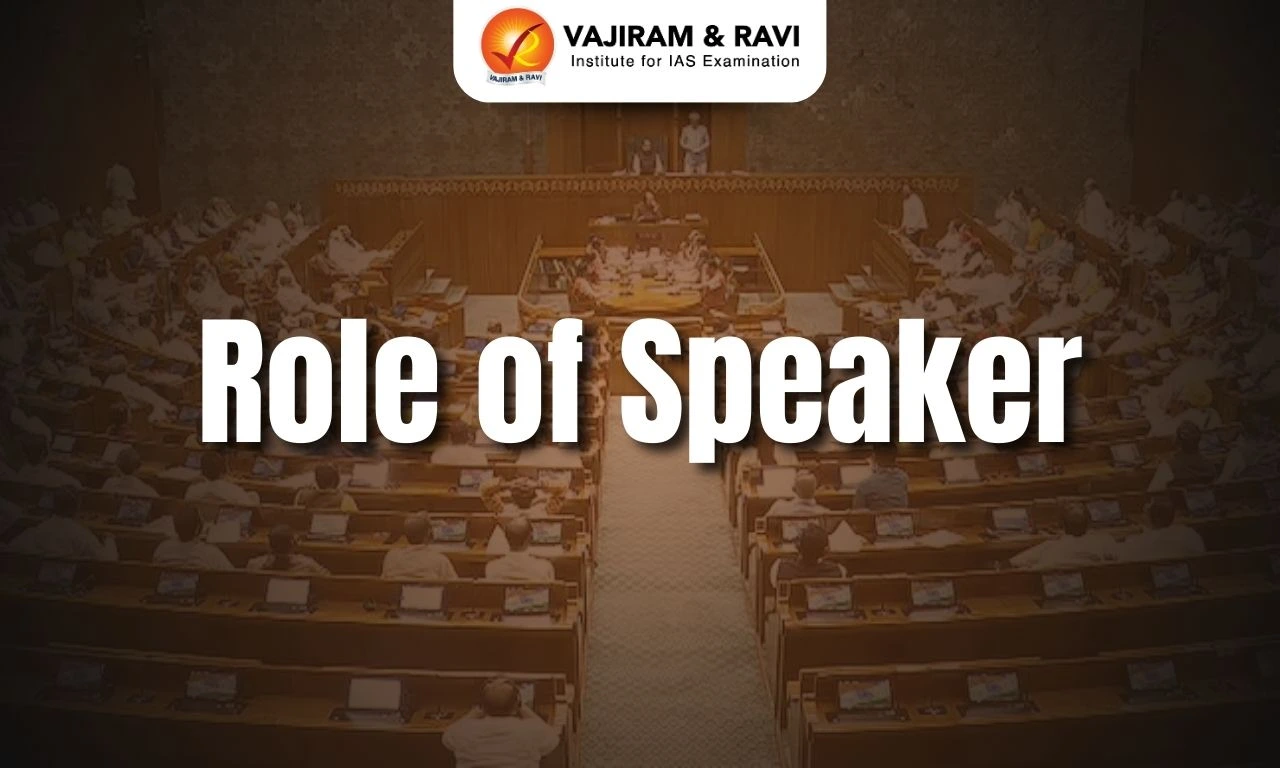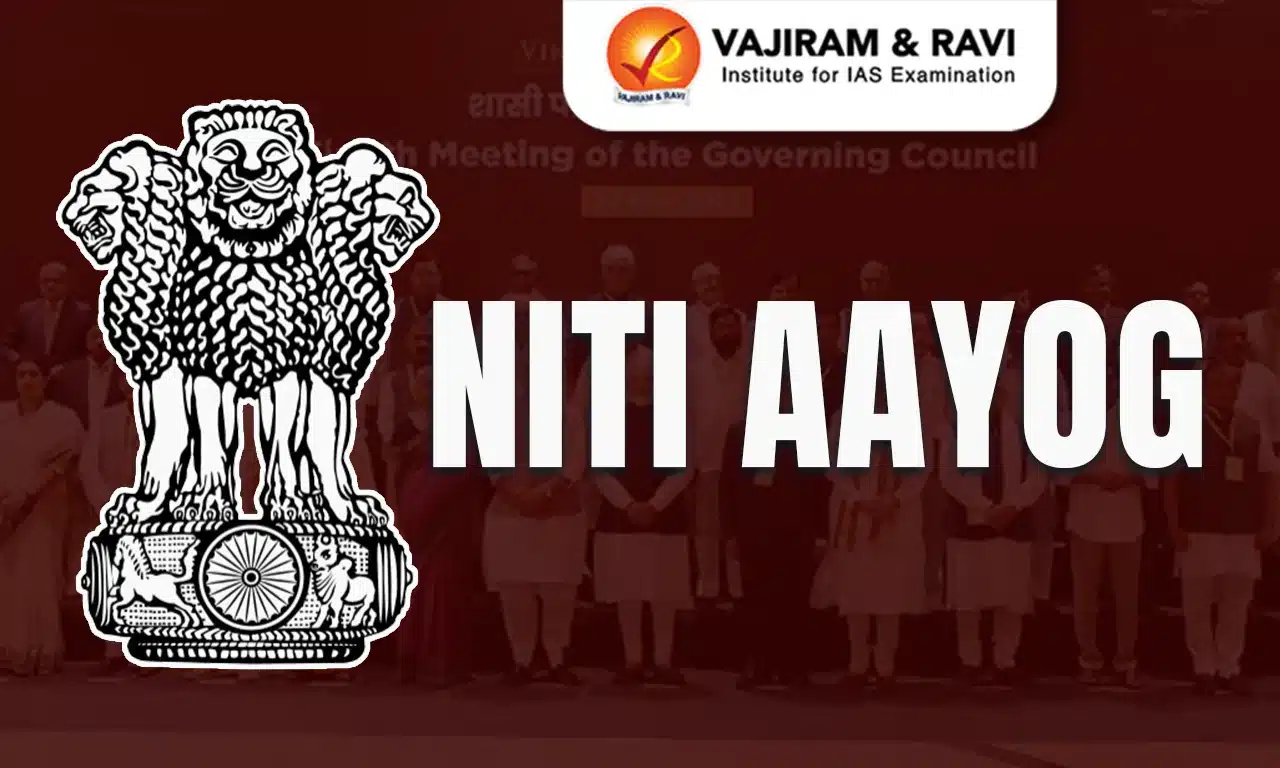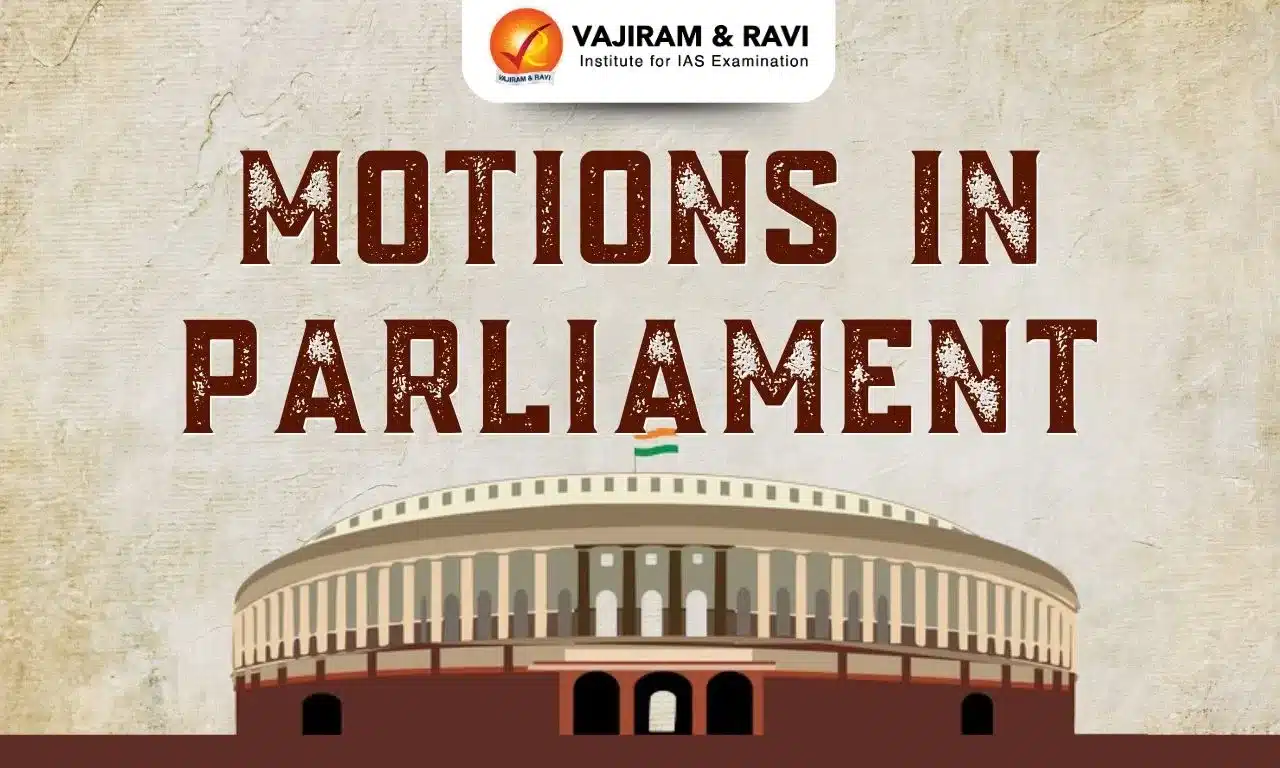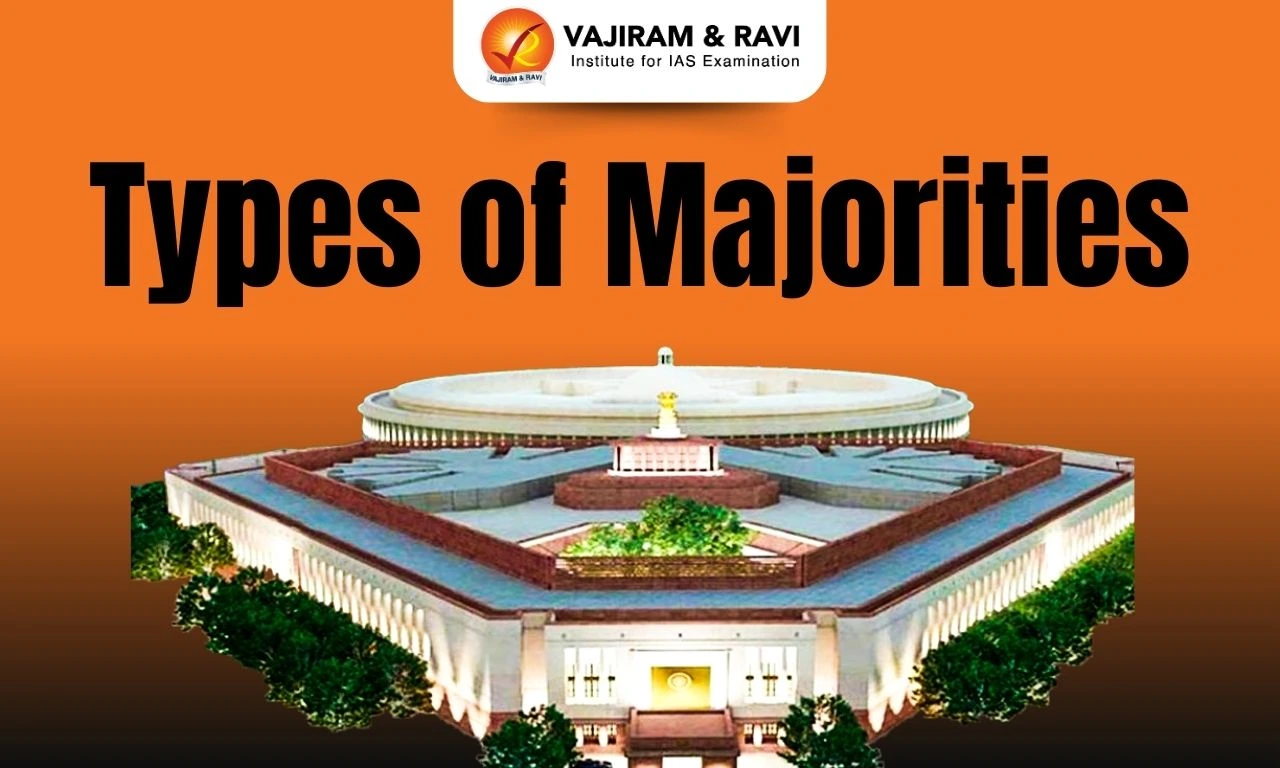Who is a speaker of the Lok Sabha?
The Speaker of the Lok Sabha is the presiding officer of the Lok Sabha, the lower house of the Parliament of India. According to Article 94, the Speaker of the Lok Sabha shall be chosen from amongst the members of the house and shall vacate his/her office when he/she ceases to be a member of the house.
- The Speaker of the Lok Sabha can be removed by a resolution passed by a majority of all the then members of the House, requiring 14 days' notice before the resolution is moved. This process is outlined in Article 94 of the Constitution and the rules of procedure.
What is the role of the Speaker in Parliamentary democracy?
The Speaker of the Lok Sabha is the highest authority in the lower house of the Parliament of India, the Lok Sabha.
Some of the specific roles and responsibilities of the Speaker of the Lok Sabha include
- Presiding over the proceedings of the Lok Sabha: The Speaker is responsible for chairing the sessions of the Lok Sabha and ensuring that the debates and discussions are conducted in an orderly and respectful manner.
- The Speaker has the authority to rule on points of order and to enforce the rules of the parliament.
- Acting as a spokesperson for the Lok Sabha: The Speaker is often called upon to represent the Lok Sabha and to speak on behalf of the Lok Sabha in public or at international events.
- According to Article 94 of the Constitution of India, the Speaker of the House of the People (Lok Sabha) does not vacate their office until immediately before the first meeting of the House after a dissolution.
- Maintaining the impartiality of the Lok Sabha: The Speaker is expected to be neutral and unbiased in discharging his or her duties, and to ensure that all members of the Lok Sabha are treated fairly and equally.
- Ensuring the transparency and accountability of the Lok Sabha: The Speaker is responsible for ensuring that the proceedings of the Lok Sabha are open and transparent and that the public has access to information about the work of the Lok Sabha.
- Playing a key role in the legislative process: The Speaker has a number of duties related to the passage of legislation, including assigning bills to committees, deciding on the order in which bills are considered, and certifying the final text of bills before they are presented to the President for assent.
- Representing the Lok Sabha in its relations with other parliamentary bodies and institutions.
Overall, the Speaker plays a vital role in the functioning of parliamentary democracy by ensuring that the parliament operates in an orderly, transparent, and accountable manner.
What are functions performed by the Speaker?
Some of the major functions performed by the speaker are
| Article 95 | The Speaker shall preside over the sittings of the Lok Sabha and shall maintain order and decorum in the house. |
| Article 96 | The Speaker shall have the right to take part in the proceedings of the house and to speak in any sitting of the house or of any committee of the house of which he/she is a member, but shall not have the right to vote in the first instance |
| Article 97 | The Speaker shall be responsible for the certification of money bills and financial bills, and shall have the power to direct that any other bill be treated as a money bill or a financial bill. |
| Article 100 | The Speaker shall have the casting vote in the event of a tie in the voting in house. |
Table- Major functions of the Speaker as given in the Indian Constitution
- Interpretation of rules: The Speaker also has the power to interpret the rules of procedure and conduct of business in the house and to rule on points of order.
- Ceremonial Duties: The Speaker also performs ceremonial duties, such as receiving foreign dignitaries and representing the Lok Sabha at national and international events.
- Appointing chairperson of committees: The speaker appoints committees and chairpersons of committees and refers matters to committees for consideration.
- Other functions: Performing such other duties and functions as may be prescribed by the rules of procedure of the Lok Sabha or as may be assigned to the Speaker by the President of India or the Parliament.
What are the issues surrounding the office of the Speaker?
While the Speaker is generally expected to be neutral and unbiased in the discharge of his or her duties, there have been instances where the office of the Speaker has faced criticism and controversy.
Some of the criticisms that have been raised in relation to the office of the Speaker are
- Partisanship: There have been instances where the Speaker has been accused of being partisan or biased towards a particular political party or ideology.
- This can compromise the impartiality and neutrality of the office, and undermine the credibility and integrity of the Speaker.
- Use of Discretion: There have been instances where the Speaker has been accused of using his discretion in an arbitrary or biased manner.
- This can lead to perceptions of unfairness or lack of transparency in the decision-making process.
- Example: Kihoto Hollohan v. Zachilhu and Others (1992): The Supreme Court held that the Speaker must act impartially and without bias while disqualifying a member. Further, the decision of the Speaker is under judicial review.
- Handling of disruptions: The Speaker is responsible for maintaining order and decorum in the Lok Sabha, and there have been instances where the Speaker has faced criticism for his or her handling of disruptions in the Lok Sabha.
- No mandatory Resignation: There is no constitutional provision requiring the Speaker to resign from his/her political party upon election. While the Speaker is expected to conduct business impartially, resignation from the party is not mandated by the Constitution.
- Relations with the media: The Speaker is expected to be the spokesperson of the house, and there have been instances where the Speaker has faced criticism for his or her relations with the media and for not providing sufficient information to the media about the proceedings of the house.
- Handling of disqualification cases: The Speaker is responsible for deciding on cases of disqualification of members of the house, and there have been instances where the Speaker has faced criticism for his or her handling of such cases.
- Example: Karnataka MLAs disqualification case, 2019: The Supreme Court recommended the Parliament to amend the Constitution regarding the role of the Speaker as a quasi-judicial authority while dealing with disqualification petitions.
What steps can be taken to make the office of the Speaker more effective?
The Office of the Speaker in India is a living and dynamic institution that deals with the actual needs and problems of Parliament in performing its functions.
To make it more effective following international examples can be looked into:
- United Kingdom: To ensure the office's impartiality, the Speaker of the House of Commons in the United Kingdom is traditionally required to resign from his or her political party upon being elected to the position.
- Canada: The Speaker in Canada has the authority to call ministers to appear before the house to answer questions and to hold investigations into matters of public concern.
- This could expand the Speaker's oversight role over the executive branch and hold it accountable to parliament.
Overall, while the office of the Speaker of the Lok Sabha is an important and respected constitutional position, it is not immune to criticism and controversy, and it is important for the Speaker to ensure that he or she is fair, impartial, and transparent in the discharge of his or her duties.
Speaker of Lok Sabha UPSC PYQs
Q1. Consider the following statements: (UPSC Prelims 2025)
- On the dissolution of the House of the People, the Speaker shall not vacate his/her office until immediately before the first meeting of the House of the People after the dissolution.
- According to the provisions of the Constitution of India, a Member of the House of the People on being elected as Speaker shall resign from his/her political party immediately.
- The Speaker of the House of the People may be removed from his/her office by a resolution of the House of the People passed by a majority of all the then Members of the House, provided that no resolution shall be moved unless at least fourteen days' notice has been given of the intention to move the resolution.
Which of the statements given above are correct?
a) 1 and 2 only
b) 2 and 3 only
c) 1 and 3 only
d) 1, 2 and 3
Ans: (c)
Last updated on February, 2026
→ UPSC Notification 2026 is now out on the official website at upsconline.nic.in.
→ UPSC IFoS Notification 2026 is now out on the official website at upsconline.nic.in.
→ UPSC Calendar 2026 has been released.
→ UPSC Final Result 2025 is expected to be released soon.
→ Check out the latest UPSC Syllabus 2026 here.
→ Join Vajiram & Ravi’s Interview Guidance Programme for expert help to crack your final UPSC stage.
→ UPSC Mains Result 2025 is now out.
→ UPSC Prelims 2026 will be conducted on 24th May, 2026 & UPSC Mains 2026 will be conducted on 21st August 2026.
→ The UPSC Selection Process is of 3 stages-Prelims, Mains and Interview.
→ Prepare effectively with Vajiram & Ravi’s UPSC Prelims Test Series 2026 featuring full-length mock tests, detailed solutions, and performance analysis.
→ Enroll in Vajiram & Ravi’s UPSC Mains Test Series 2026 for structured answer writing practice, expert evaluation, and exam-oriented feedback.
→ Join Vajiram & Ravi’s Best UPSC Mentorship Program for personalized guidance, strategy planning, and one-to-one support from experienced mentors.
→ Check UPSC Marksheet 2024 Here.
→ UPSC Toppers List 2024 is released now. Shakti Dubey is UPSC AIR 1 2024 Topper.
→ Also check Best UPSC Coaching in India
Role of Speaker FAQs
Q1. What is the significance of the office of Deputy Speaker of Lok Sabha?+
Q2. What is the term of the speaker of Lok sabha?+
Tags: quest role of speaker














